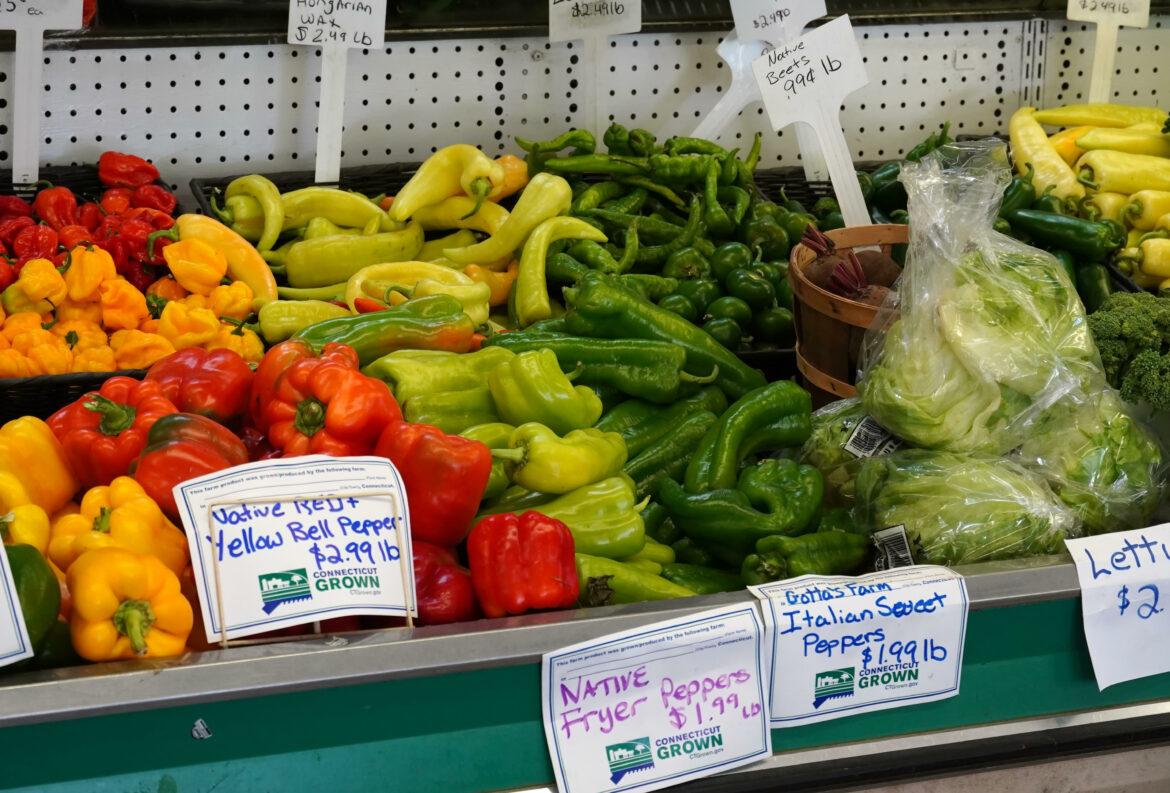Part of the Food Policy Snapshot Series
Policy name: New England Feeding New England
Overview: New England Feeding New England is a project of the New England Food System Planners Partnership whose goal is that by 2030, 30 percent of all food consumed in New England will be produced within the region.
Location: New England: Maine, New Hampshire, Vermont, Massachusetts, Rhode Island, and Connecticut
Population: ~15.1 million
Maine – 1.4 million
New Hampshire – 1.4 million
Vermont – 0.6 million
Massachusetts – 7.0 million
Rhode Island – 1.1 million
Connecticut – 3.6 million
Food policy category: Sustainable agriculture, food security
Program goals: To create a reliable local food supply in order to ensure that all New England residents have enough healthy food to eat every day.
How it works: The project is split into three phases. The research phase ran from 2021 through 2022, during which the Partnership conducted research to determine how to reach their “30 by 30” goal. This phase included:
- Establishing food production milestones and identifying how much additional agricultural acreage is needed
- Examining the economic impact of the New England regional food system
- Identifying local organizations involved in working to support the “30 by 30” goal
- Developing an assessment tool to identify how to make food systems more resilient.
The convening phase runs from 2023 through 2024 and includes dissemination of the research findings and meetings with stakeholders.
The implementation phase, from 2023 through 2030, will involve working with local food system partners and taking action to reach the “30 by 30” goal.
Progress to date: In 2014, the New England Food Vision was released, describing a vision in which half of all food in New England would be produced within the region by 2060 and nobody would experience hunger. New England Feeding New England was launched in 2019 and is now in the convening and implementation phases described above.
Why it is important: As of 2014, 90 percent of food in New England came from outside of the region and up to 15 percent of families regularly did not have enough to eat. Because of deep-rooted barriers in the food system producers in New England currently do not produce enough food to meet the “30 by 30” goal. The research phase findings state that:
- “Our food systems are unjust, built from violence, stolen land, underpaid work, discrimination, and unequal access to healthy food,” and therefore, a sustainable and resilient food system must focus on the health and power of communities of color.
- New England’s food systems are unsustainable because they use too many resources and contribute too much waste, so a reduction in food waste and an increase in climate-smart agricultural practices and plant-focused diets must be prioritized.
- New England’s food systems are not resilient, as they rely on supply chains that are vulnerable to climate change and lack any strategy to maintain a healthy food supply long-term.
The food system accounts for 10 percent of all jobs in New England, but most of those jobs are in food services (e.g. restaurants and fast food), while agricultural workers and fishermen are largely undersupported. Farms and fisheries accounted for only two percent of all food system sales in 2017.
Consuming more locally produced food would support local jobs and businesses and allow farms and fisheries to become more sustainable.
Program/Policy initiated: The program was launched in 2019 and implementation began in 2023.
Point of contact:
Leah Rovner, Project Director
Email: leah@nefoodsystemplanners.org
Similar practices: Food Action Plans that emphasize sustainable local food systems have been developed in many locales, including Seattle, Washington; Niagara Falls, New York; Sonoma County, California; Massachusetts; Arizona; and the University of Virginia.
Evaluation: Evaluation has not yet been conducted.
Learn more:
- Food for the Future: A Vision for New England Farming and Food Production (Brandeis Now)
- New England Feeding New England: June 2023 Newsletter (New England Food System Planners Partnership)
- The New England Food System in 2060: Envisioning Tomorrow’s Policy through Today’s Assessments (University of New Hampshire)
- Report Examines New England’s Ability to Supply Food for the Region (Eco RI News)
- USDA Researching New England’s Ability to be Self-Reliant in Food Production (Tri-State Livestock News)
- USDA Survey Shows Growth in New England’s Local Food Sector – But There’s Still Work to Do (Farm to Institution New England)
References:
- 50 by 60: A New England Food Vision (Food Solutions New England)
- Arizona Food Action Plan (Arizona Food Systems Network)
- Food Action Plan (Seattle Office of Sustainability and Environment)
- Food Action Plan (Sonoma County Food System Alliance)
- MA Local Food Action Plan (Mass.gov)
- New England Feeding New England: Cultivating A Reliable Food Supply (New England Food System Planners Partnership)
- Niagara Falls Local Food Action Plan (Create a Healthier Niagara Falls Collaborative)
- A Regional Approach to Food System Resilience (New England Food System Planners Partnership)
- Report Components (New England Food System Planners Partnership)
- Resilience Assessment (New England Food System Planners Partnership)
- Sustainable Food Action Plan 2021-2030 (University of Virginia)


